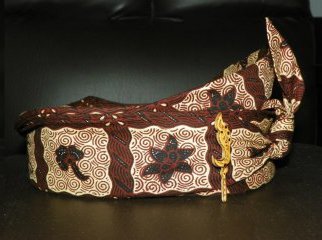THE MEANING OF PHILOSOPHY "IKET" SUNDA
"Iket" is a piece of fabric that is shaped in such a way and is used as a headgear. In tatar Sunda commonly called with totopong, iket, or udeng (udeng term almost the same that we find in Bali). Use of iket is related to daily activities or when there are official events such as traditional ceremonies and customs discussions.
There is no written evidence of the historical source of naming iket or what is now called iket's likeness. However, in the development of the era, naming the form iket become part of a culture that contains value and its own meaning.
The naming or likeness of iket is categorized according to the times, iket buhun (ancient) and iket kiwari (now). To iket buhun itself there is a form of iket that has become a hereditary hereditary from the ancestors, there are also iket form who was born from the kampung adat. Meanwhile, for iket kiwari, iket is an invention of some people who have a sense of pride in the culture of iket and creativity from the value of local wisdom.
Even some form of iket kiwari itself still has a characteristic that refers to the pattern of iket buhun form. Some of the names of iket buhun are known by most are generally Barangbang Semplak, Parekos Jengkol, Parekos Jackfruit, and Julang Ngapak. Parecos or paros have the meaning of "closing" the top of the head or almost wrapping.
In iket, it contains philosophy. This is what makes iket itself become one of the ancestral heritage that contains so high value. Like the philosophy contained in the form iket Julang Ngapak which supposedly formerly used by the pandita kingdom or called purahita.
The philosophy contained in it is based on the inhalation behavior of a Bird of Julang / Manuk Julang (Sundanese Wrinkled Hornbill). This type of bird before they get the water source, they will not stop looking. This character is adopted into symbols as well as philosophy in the form iket Julang Ngapak, that we should never tire of finding the source of life (science, darma, and identity) before achieving the desired results.
Beyond the likeness or name of Sundanese iket itself contains the value of philosophical meaning is very great. The philosophy is known as Dulur Opat Kalima Pancer. Dulur opat is the four core of life that is Fire, Water, Land and Wind. and Kalima pancer contains meaning that is centered on ourselves. Broadly speaking, Dulur Opat Kalima Pancer means that the four core elements are in us and centered together as a self-realization.
Regarding the kiwari iket that has developed at this time, the naming and form remains based on the pattern of iket buhun form. Without diminishing the noble value of the ancestral heritage, so even kiwari iket has philosophical values in it. This is part of a culture that is creative, but still hold firmly the value of local wisdom. especially among the younger generation. They have different perspectives in shaping iket but still have a reference to a line of creation of Buhun (ancient) works.
Until now the use of iket more popular especially among adolescents and this is a positive action to better understand the culture of our ancestors and who our identity.
Assessed means that the people of Sunda with the unity of nature. Because iket head has a philosophy that is lived by the Sundanese society that bersenyawa with wind, seune (fire), taneuh (land), cai (water).
The main elements of life are tied to one in the head. Being a symbol, that the wearer is bound by the philosophies of life he embraces.
The philosophy of life is a character of delay as the path to virtue of life. Sundanese characters in question is cageur (healthy), bageur (good), bener (true), singer (introspection), and smart (intelligent).
In social relations, the Sundanese people are basically based on the attitude of silih asih, silih asah, and silih asuh. It means mutual love, mutual sharpening or teaching, and caring for each other to create an atmosphere of community life colored with intimacy, harmony, and peace.
